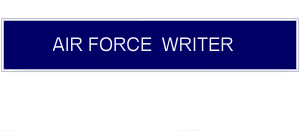Back to Air Force EPR
Defending Your Rating
Occasionally, after you've written an EPR, your supervisor will approach you and attempt to make you change your rating. The coercion can range from pointed questions to suggestions to threats of retaliation. Sometimes they want to lower the rating, sometimes they want to raise it.
My first advice is to listen to the supervisor. Usually your supervisor has more experience than you and often has good advice. They may have been in the same situation and may be able to save you some trouble or at least help you avoid regretting your decision. Listen carefully and give their advice serious consideration. Sometimes it can be a bitter pill to swallow but worth it in the long run. The most common advice, and rightfully so, is to avoid giving an Airman an undeserved five. As supervisors, it's very hard to impartially assess a ratee's performance. Often we're friends and we all know we have a tendency to be lenient in our ratings.
At other times we're pressured to lower an Airman's rating. Your supervisor may have observed less than sterling behavior on the part of your ratee or may have had an argument with him or her in the past that produced a lingering dislike. It's your job to determine if the supervisor's feelings are based on fair, consistent judgement or the product of a personal dislike and an isolated incident. Listen to the supervisor but hold your own counsel. Supervisors are human like the rest of us and not immune to bad judgement. Just because they're senior in rank, it doesn't make them right.
Unfortunately it's just as common to have a supervisor tell you to raise an Airman's rating and give them a five --often even before you've decided on a rating yourself. This kind of interference always annoyed me because usually, the subject of this favor was the supervisor's friend or an attractive, young female Airman. This happened to me twice as a young NCO and I'm not proud to say that both times I eventually gave the individuals an overall five. And the reason I say I'm not proud is, the conflict and frustration I felt as a result of being told to assign a certain rating clouded my judgement so much that I couldn't tell if my final decision was my own honest opinion or influenced by my supervisor. They may have received fives anyway. I don't know. But whatever the case, the end result is that it feels like I knuckled under to my supervisor's demands. This type of management is bad for morale. Not only does it demonstrate how little respect your rater has for you and your judgement as a supervisor, it also fosters an unhealthy working environment and reduces efficiency. Few things can make a workcenter less productive than preferential treatment by the NCOIC.
If you feel certain that your judgement is correct, stand your ground! It is common for the rater and the rater's rater to disagree on an Airman's rating. If your supervisor tries to tell you that your rating and his rating must agree, he's wrong. That's what the Additional Rater's block is for: so he can provide his own rating. But you should be prepared to defend your position. And by defend, I don't mean you have to prepare documenation or mount a legal defense. I just mean that you should be prepared to explain why you gave someone a certain rating. Because someone in the chain of command might ask. If you give an Airman an overall 4, even though a 4 is supposed to be Above Average, everyone knows that the end result, because of the points, is that the person being rated will have a hard time being promoted. Because of that, sometimes the Flight Commander or Chief of Maintenance will call you into his office and ask why this person received a four just to be sure it's fair. If that happens, all you have to do is describe the performance that led to your rating decision and 99% of the time, they will accept your reasoning.
